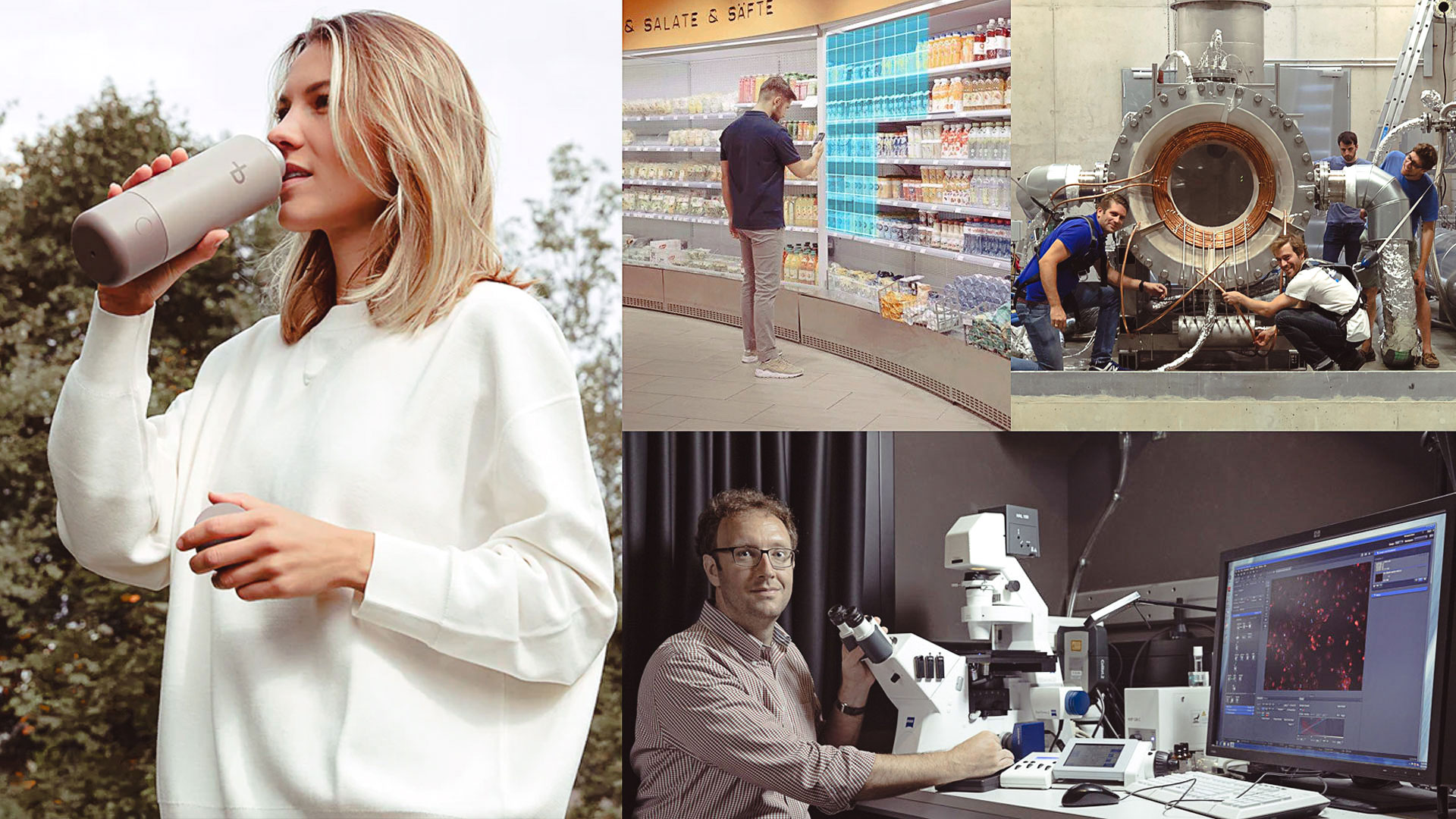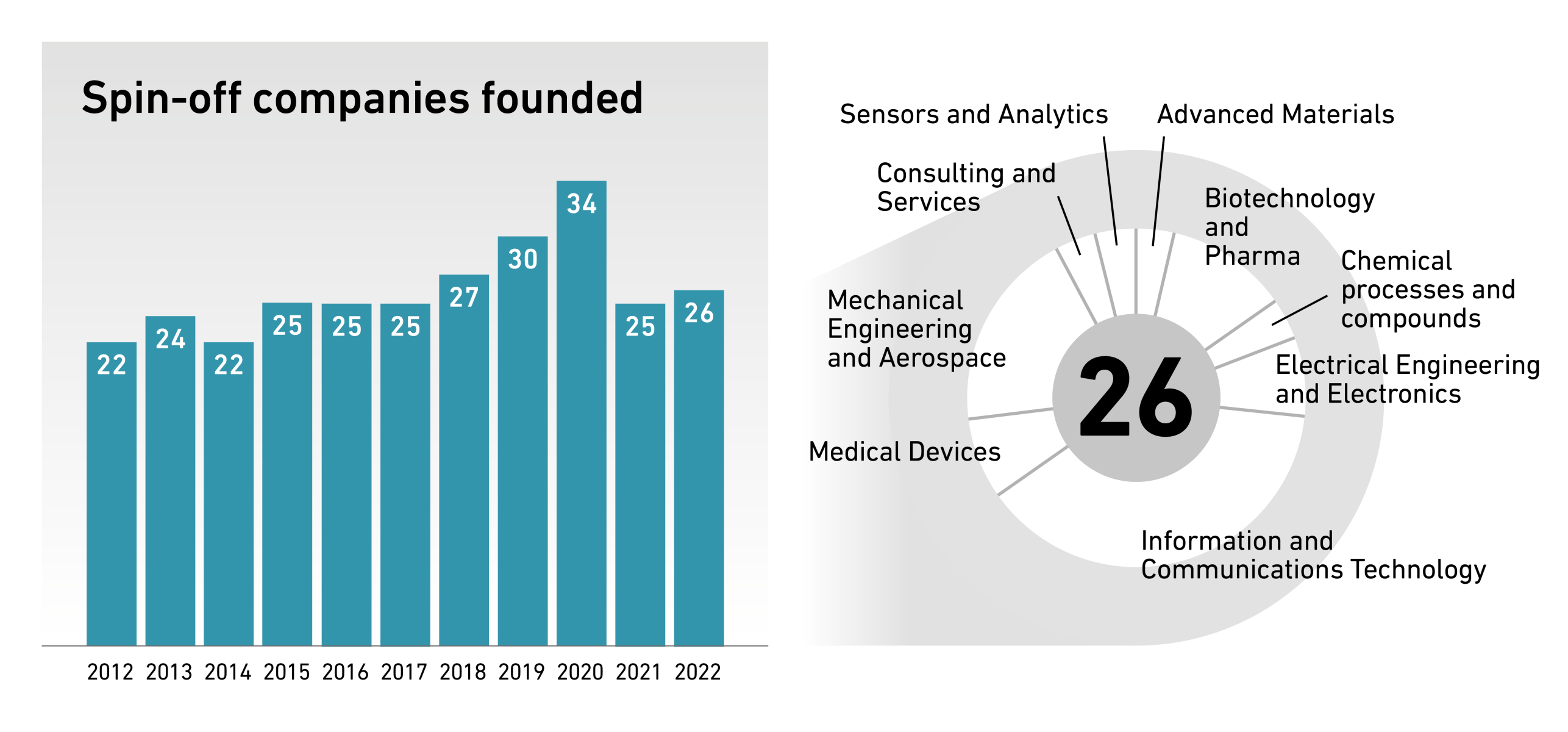A grand total of 26 spin-offs were founded at ETH Zurich in 2022. Their businesses range from new cancer drugs and sustainable water bottles to digital mapping of urban traffic flows. The ETH spin-off family also welcomed three new unicorns and raised 1.2 billion Swiss francs in fresh capital.

Over the past year, ETH has seen the creation of 26 new spin-offs. These newly founded spin-offs cover a wide variety of fields and reflect the entire range of topics at ETH Zurich. The largest group (10) of the 2022 spin-offs are again focused on the IT and communications technology sector - a trend that has continued for several years. However, the problems these companies address are very different: while Calvin Risk AG offers a kind of artificial intelligence insurance, Cerrion AG uses AI and sensors to monitor and improve entire production processes. The ETH spin-off Transcality AG creates complex models, or digital twins, of traffic systems that make it possible to analyse a city's traffic flows and simulate future scenarios.
Working to enhance mental and physical health
A striking number of the new ETH spin-offs develop solutions for the healthcare sector. Three young companies are working on novel cancer drugs or on improving existing therapeutics, while two others offer apps that help to reduce stress and increase mental and physical well-being. Another one is Kairos Medical AG, which develops biodegradable bone implants. These are able to stabilise bones during healing, but - unlike conventional metal screws - they then dissolve in the body over time.
Spark the entrepreneurial spirit before graduation
No fewer than four of the new spin-offs came to life in the Student Project House - ETH's ideas workshop for its students. One such spin-off is Bottleplus, which produces a sustainable water bottle that can be used to make carbonated water on the go. Another is AtlasVR AG, which provides virtual reality technology for professional training programmes. "We want society to benefit from our research findings and innovations as quickly as possible. I'm enormously pleased that the Student Project House is succeeding in encouraging students to pursue their ideas and bring them to market," says Vanessa Wood, Vice President for Knowledge Transfer and Corporate Relations at ETH Zurich. To further promote entrepreneurship among students and get schoolchildren excited about STEM subjects, ETH also entered into a strategic partnership with UBS in summer 2022.
Three new unicorns and numerous acquisitions
Investment in ETH spin-offs also saw positive development last year. The companies raised around 1.2 billion Swiss francs - more than ever before. Three ETH spin-offs also attained unicorn status in 2022: the term refers to start-ups that are so promising that their market value exceeds one billion dollars even before they go public. These three companies are Scandit, which enables fast scanning even under difficult conditions, as well as Southpole and Climeworks, both of which are dedicated to the fight against climate change.
There were also a number of successful acquisitions: for example, the spin-off Adresta was bought by Bucherer, Animatico was acquired by Nvidia, and FGen was taken over by Ginko Bioworks. Vertical farming herbs from ETH spin-off Yasai also found their way onto Coop shelves in 2022, and Synhelion announced a strategic collaboration with Swiss International Air Lines. "It's important for ETH that good technologies and ideas give rise to companies with growth potential and thus create new jobs. In this way, the success of our spin-offs becomes the success of Switzerland," says Vice President Vanessa Wood.
ETH spin-offs over the years
Since 1973, a total of 540 spin-offs have been created at ETH Zurich. You can find a list of all spin-offs and a good overview of the key details here; information on acquisitions and IPOs of ETH spin-offs can be found here. Recognised ETH spin-offs receive support from the ETH Domain Knowledge Transfer and Corporate Relations during their foundation and in the often crucial following years in the form of consulting, licensing of ETH technologies and networking. A comprehensive analysis by the University of St.Gallen in 2020 showed that ETH spin-offs perform better, create more jobs and are also acquired more often than the average Swiss start-up.







